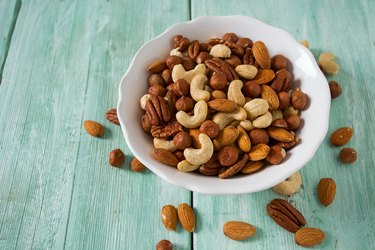
If you plan to follow a diet that can help lower your blood pressure, go a little nuts. The National Heart, Lung, and Blood Institute recommends the Dietary Approaches to Stop Hypertension (DASH) diet to lower your blood pressure. And DASH includes one serving of nuts four to five times each week.
Read more: 9 Healthy Nuts That May Help You Live Longer
Video of the Day
Video of the Day
Eat Nuts for Heart Health
Here's what is in nuts that make them heart healthy: They're loaded with fiber, protein, minerals and antioxidants, according to the American Heart Association. High-fiber foods may help to lower blood pressure, according to the Mayo Clinic. Nuts are among your best fiber choices, the Mayo Clinic says.
Peanuts, even though they are a legume (like beans) and not a real nut, have many of the same healthy nutrients. Peanuts also offer the amino acid arginine, which is converted to nitric oxide in the body and helps keep your blood vessels from hardening, according to Nutrition Australia. The more elastic your arteries, the more easily your blood circulates and the less pressure it requires to get around your body.
Another plus to peanuts for blood pressure: The fat in peanuts is mostly a healthful type of fat that can help prevent cardiovascular disease and high blood pressure, says JoAnn Carson, PhD, RD, a retired professor of clinical nutrition at the University of Texas Southwestern Medical Center and former chair of the nutrition committee of the American Heart Association.
Most nuts are created equal, Carson says. But walnuts have one advantage: They are high in omega-3 fatty acids, the same heart-healthy fat that's found in oily fish and that the American Heart Association recommends.
Keep It to a Handful
Before you go totally nuts for nuts, it's important to remember that a serving of nuts is not unlimited, Carson says. Nuts are high in calories, so you should limit your serving to one-third cup of raw nuts or 2 tablespoons of nut butter.
Too many calories can result in weight gain, and excess weight can put strain on your heart and up your blood pressure, according to the American Heart Association. While most of the fat in nuts is healthy, they also contain some saturated fat. That's another reason to eat nuts in moderation.
Nuts are naturally low in sodium. So, don't spoil the prize by choosing nuts to which salt has been added. Look for the words "raw" or "unsalted" on the package when buying. The best nuts are those that are dry-roasted. However, because nuts are quite dense, they can't absorb much of the oil that they are cooked in, according to Nutrition Australia, so even oil-roasted nuts are OK.
When shopping for healthy nuts and nut butters, look for those without added sugar or fat too, Carson says.
Grinding It Up
The best nut butters are those made from ground nuts and nothing else, Carson says. Often, she says, you can go to a health food store or grocery store and buy or grind your own from peanuts or almonds or cashews, and that way you can be sure your nut butters have no additives. Some nut butters have added salt, sugar and fats (palm oil) to give them a longer shelf life. You can tell by reading the nutrition label, she says.
When choosing nut butters, pick your favorite as they are all about equal in calories and heart-health benefits, Carson says. Just be sure you're getting the butters and not nut spreads, as spreads such as Nutella are likely to have added sugar and palm oil and possibly even cocoa.
Finally, Carson says, watch what you eat with your nut butters. "If you're slathering your nut butter on white bread with jelly, it's not nearly as beneficial as eating a small amount of peanut butter on a celery stick or two."
- Mayo Clinic: "Nuts and Your Heart: Eating Nuts for Heart Health"
- Mayo Clinic: "Nutrition and Healthy Eating"
- JoAnn Carson, PhD, RD, retired professor of clinical nutrition, University of Texas Southwestern Medical Center, and former chair, nutrition committee, American Heart Association
- National Heart, Lung, and Blood Institute: "DASH Eating Plan"
- American Heart Association: "Managing Weight to Control High Blood Pressure"
- American Heart Association: "Go Nuts, But Just a Little"
- Nutrition Australia: "Nuts and Health"
Is this an emergency? If you are experiencing serious medical symptoms, please see the National Library of Medicine’s list of signs you need emergency medical attention or call 911.